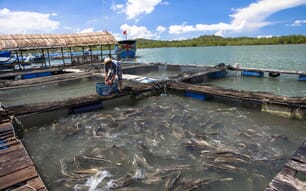Fish sellers in Nigeria have been accused by farmers of holding something of a monopoly over fish sales, making it hard for farmers to make a decent profit. As a result feed producer Aller Aqua organised the workshop on 4 May, to discuss how farmers can reach customers directly.
Nurudeen Lasisi, Aller Aqua’s manager in Ghana, said that the lives of Nigerian catfish farmers have not been impacted positively by the power of the fish sellers.
“Nigeria is a major producer of catfish but farmers are not regarded as wealthy because there are fishmongers who benefit heavily from them, as farmers cannot get to consumers directly,” he said.
He explained that the workshop focused on innovative marketing techniques in order “to train farmers on the marketing value chain to diversify their markets using innovative techniques that will improve their return on investment”.

The vice-president of the Tilapia and Aquaculture Developers Association of Nigeria, Nurudeen Tiamiyu, noted that the annual fish deficit in Nigeria is 2.6 million metric tonnes.
“Nigeria imports fish that are cheaper than the ones produced locally because of the cost of production, and with the dwindling resources of Nigerians, locally produced fish is threatened,” he said.
He added that “fish farmers are not profiting from their labour, market women who are fishmongers are the ones benefiting. Fish farmers should create and control their own market”.
“We realise that it is the fishmongers that are making the profit out of the sweat of the farmers. Now the farmers need to use that same structure that the market women have used over the years to create their own market and eliminate the market mongers by putting their own structure in place to service the same market,” he argued.
Most fish farms in Nigeria are smallholder operations, whose owners are unable to buy fingerlings and other inputs in bulk. Lack of access to credit is a major problem, so they naturally fall prey to fishmongers who pay them low prices for their catch. The problem is worsened by the fact that the farmers also have to compete with a substantial amount of (often illegally) imported fish.


